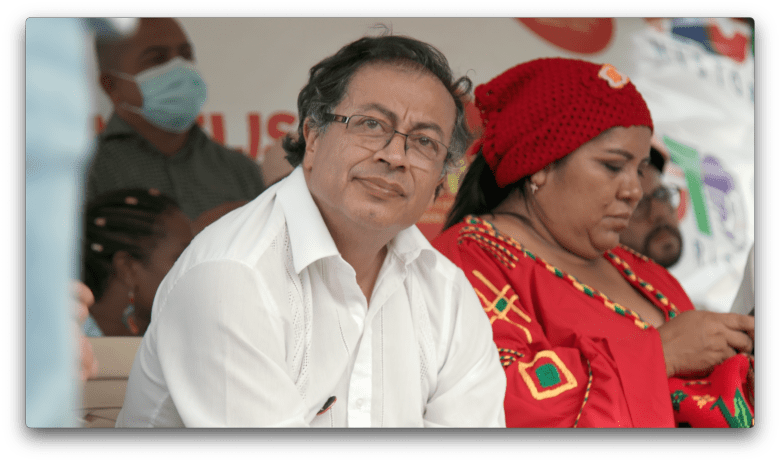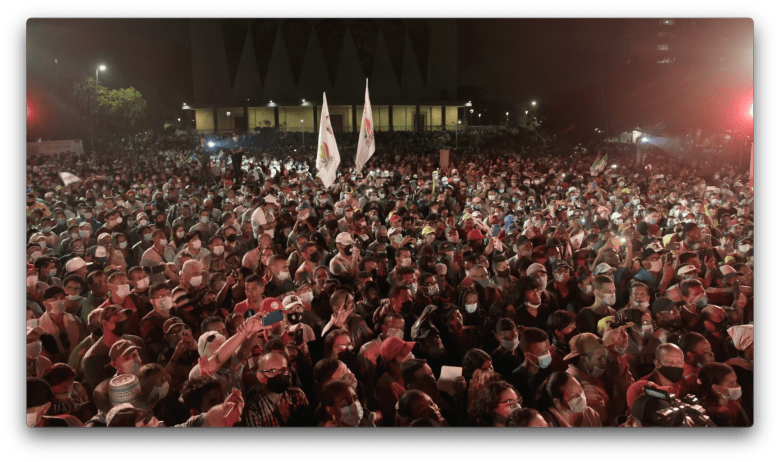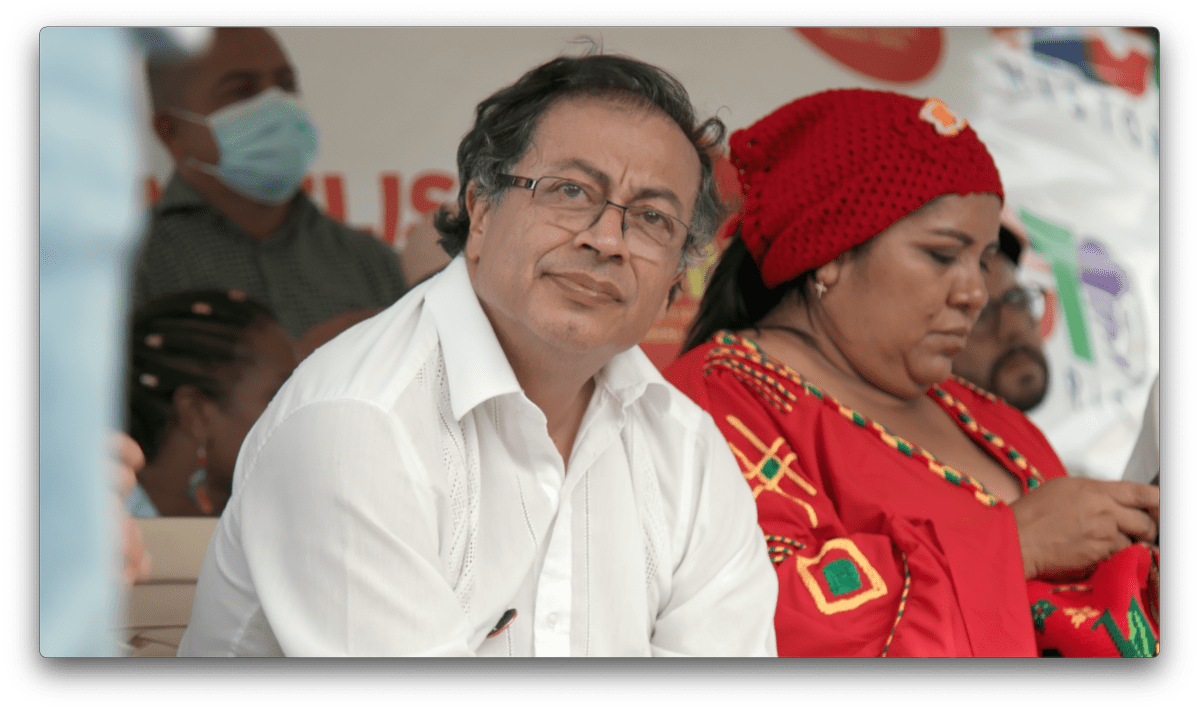
The story of Gustavo Petro, a former exiled M-19 guerrilla leader who became the first elected progressive left president of Colombia in 2022, is the perfect fodder for film.
So, Emmy Award-winning filmmaker Sean Mattison and producer Trevor Martin turned the story into their documentary “Petro,” which will have its world premiere in the Documentary Feature Film competition at the 2024 Slamdance Film Festival.
The story follows Petro through the ins and outs, highs and lows of his political campaign from September 2021 through Election Day in the summer of 2022, but Mattison and Martin had been following the politician’s life since 2006.
“We worked on a couple of student films about the work Petro was doing to highlight links between paramilitary groups in Colombia and the former government of President Álvaro Uribe, who became Petro’s political nemesis,” Mattison said. “We made those films through our friend and producer Julián Espinal.”
Fifteen years later, Mattison and Martin realized that Petro might have a chance to win Colombia’s 2022 presidential election, so they reached out to Espinal, whom they have remained in contact with throughout the years, and asked if he would set up a meeting with Petro.
“We got in touch with Petro through Julián, and kind of took his temperature on whether he would like to make a documentary about his campaign,” Mattison said. “We knew it would be the first time a progressive left candidate would ever win the Colombia presidential election. So, it was a gamble in terms of what the outcome would be, but we wanted to jump in.”
The meeting wouldn’t have happened if it weren’t for the trust Espinal had with the filmmakers.
“As far as putting the access back together with Petro, I can’t express enough the role Julián and his family played,” Martin said. “We first met Petro when he was exiled from Colombia due to death threats. And he was living with his family at Julián’s house, who provided refuge.”
Mattison and Martin met with Petro in 2021, and the politician agreed to participate in the film and gave them bits of access throughout the shoot, Mattison said.
“As filmmakers, we always want a little more, but we managed to get some intimate moments and poignant interviews, and weave that together with the story of the rest of the Colombian progressive movement at the crossroads of the country’s history,” he said.
Mattison also made things clear that the film wasn’t going to be a propaganda film about Petro.
“We never tried to pretend that he was going to save the country,” he said. “We wanted to get all perspectives, and found ways to include voices that would lend credibility to the project.”
One of those ways was to gain access to Petro’s opponents, namely Rodolfo Hernández and Federico Gutiérrez, Mattison said.
“It was interesting with Rodolfo, because his campaign was very atypical,” he said. “Rodolfo didn’t have a traditional campaign apparatus, and a lot of the money his campaign was spending was going into outreach groups in social media. And the campaign was successful, despite the fact that it didn’t have all the trappings of a normal campaign.”
Most of Hernández footage was taken during a campaign stop in Barranquilla, Mattison said.
“We made a game-time decision to go on that trip, and it was very fortuitous, because a few days later he suspended other campaign events before the election,” he said. “I would have loved to have my own sit-down interview with him but our access to him was difficult.”

With Gutiérrez, Mattison and Martin said they spoke with him in person a couple of times.
“He was always adamant that his press chief needed to arrange an interview,” Mattison said. “He was willing to talk to me, but his handlers were not as enthusiastic about that possibility.”
The third person the filmmakers wanted to talk with was former Colombian President Uribe.
“We pursued him for six to seven months through his press people, and we told them we would do what it takes to get the interview.”
Still, after a few months of back-and-forths, the answer was no, so Martin and Mattison had to tell that side of the story through archival footage.
“We were lucky to work with a great team that found some rich archives that we used to tell the story,” Mattison said.
Martin has seen the growth of politicians not trusting the media, whether it’s news or documentarians, over the years.
“It is difficult to tell a political story these days, anywhere really,” he said. “There has been a hostility that has pervaded from the political camps, and that was a challenge.”
Even some of the people in Petro’s campaign didn’t seem excited to see Mattison and his crew.
“They knew that our end product wouldn’t come out until after the campaign, so we were not their top priority,” he said.
Another concern was keeping safe during a volatile political time in Colombia.
“Remember, this was the first time a progressive left politician had the chance of being elected,” Mattison said. “We needed to stay close to the security detail when we were with Petro and other other politicians. And we had to keep our wits about us and take all the necessary measures to ensure the crew’s safety.”
Still, the filmmakers took calculated risks to ensure they could tell the story, Martin said.
“We have a good network in Colombia, and we were always cognizant of the security considerations,” he said. “At the same time, we didn’t want that to be a constraint from telling the story if the conditions were right to do so. There were a couple of moments that Sean and the crew encountered that were on the unpredictable and scary side, but we were fortunate that we weren’t present for any type of assassination attempts.”

Throughout the project, the filmmakers also faced other challenges that included funding and traveling.
“Petro’s people didn’t share his traveling schedule until the night before or the day of,” Mattison said. “So we didn’t have a production schedule until the night before, and that was contingent on airfare and other things.”
Sometimes Petro’s itinerary would become too much for Mattison and the crew.
“He would sometimes meet with business leaders in one city at 10 a.m. and do a mid-afternoon campaign rally in a different city and then do an evening rally in a third city,” Mattison said. “For us it is almost impossible to keep up, and there were times we had to say it was too much to buy plane tickets for four people to go to cities on the opposite ends of the country. But we learned how to adapt, and we basically had all of our bags packed if we needed to go to the airport right then. In retrospect, I would probably go to fewer campaign rallies than we did.”

